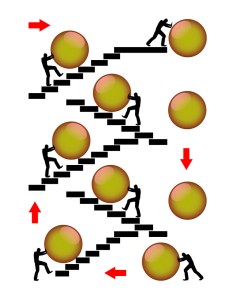 I’ve had several interesting conversations with people over the past few weeks about how useful they feel at work. They feel as if their management treats them as commodities: “You do this work and we will pay you and give you health insurance.”
I’ve had several interesting conversations with people over the past few weeks about how useful they feel at work. They feel as if their management treats them as commodities: “You do this work and we will pay you and give you health insurance.”
That’s a transactional way to think about work.
However, useful work requires more humanity-focused thinking and less commodity thinking. The most valuable work we can do is to offer people insights into how they live and work in the world. That’s why I don’t think of “work” as just what people do in and for organizations, but for everything people create. Yes, that includes books of all kinds.
People can evaluate information to offer new and different perspectives. Often, we can generate insights together. That allows us to create new options and new paths.
My colleagues are correct—some of their work is not very useful.
What Less-Than-Useful Work Might Be
Too many people in larger organizations do work that is of questionable value. Here’s what that might look like:
- Transforming one kind of data into another kind, without adding any insights to the data. If you’ve ever had to transform data in a spreadsheet to a database or the other way around, you’ve done this. This work might be useful, but only because we don’t have the tools to easily do it. (This is an excellent use case for the various AI “tools” we have now.)
- Filling out a template of any kind that explains status or progress. (Progress is a funny thing. It’s all a farce until you see a demo or the final product.)
- Grunt work that adds no perceivable value to the person doing the work. Here’s an example: When people have to do the work to appease “automated” HR systems, such as filling out vacation requests. (Why should adult humans have to fill out a vacation request form??? What is the manager going to say? No?)
The data transformation or template work offers zero value to the person doing that work. Worse, it offers questionable value to the person receiving that work. That’s why I love the idea of “AI” focused spreadsheet tools. Set the AI off on that nonsense and free humans to do useful work.
Grunt work exists because someone, somewhere, possibly not even here, ran afoul of the bureaucracy. Now, managers have solidified those rules into grunt work.
That’s not useful. But there is plenty of useful work we can do.
A Possible Definition of Useful Work
We can tell our work is useful when it fulfills any of these conditions:
- Offers answers or solutions to the other person’s problems. (A direct answer.)
- Helps the other person reframe their problems in ways that offer that person more options. (Might change the context.)
- Facilitates other people’s discussions so they can agree on the current or updated context. (Bring a group of people together so they can then rethink the problem.)
That’s useful work.
It’s true that a direct answer might come from a book, web page, or an AI bot. However, in most organizations, we need our small-world networks to discover that direct answer. Not because people in the organization hide that information, but because they don’t know we need that information.
We often don’t need perfect data to help other people see problems differently. Instead, we need fast, imperfect data to notice the first possible change.
As for facilitating discussions, we can sometimes do that from anywhere. Other times, we need to bring people together in the same physical space at the same time. But the facilitation is useful because it reduces the cycle time to make decisions. And that will make everything in the organization flow better.
The big difference between useful and less than useful work? Useful work requires our humanity. That’s how we know it’s useful.